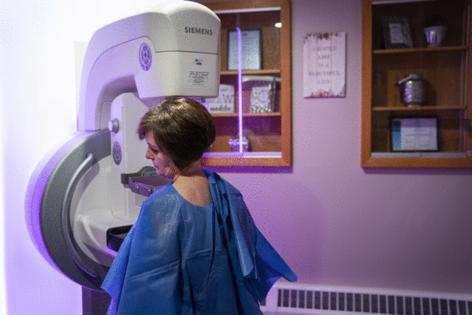Federal task force urges regular mammograms for all women ages 40 to 74
Published in Women
To counteract growing rates of breast cancer in younger women and to reduce racial disparities in deaths, an influential panel has changed its advice and is urging most women to begin getting regular mammograms starting at age 40.
The new recommendations from the U.S. Preventive Services Task Force say women without genetic mutations that make it extremely likely they will develop breast cancer should get their first mammogram to screen for the disease at age 40 and should continue with the exams every other year until they turn 74. The guidelines were published Tuesday in the Journal of the American Medical Association.
Breast cancer is one of the most common cancers among women in the U.S., as well as one of the deadliest. An estimated 297,790 U.S. women were diagnosed with the disease last year, and 43,170 died of it, according to the American Cancer Society.
The task force, a group of 16 experts convened by the federal government, sparked an uproar 15 years ago when it said women could wait until 50 to begin regular, biennial breast cancer screening — much later and less frequent than what other medical groups were recommending at the time. The group’s rationale was that women in their 40s faced a low risk of breast cancer and that frequent testing of asymptomatic women in this age group caused too many to endure biopsies and other invasive procedures that were unnecessary and potentially dangerous.
The task force reaffirmed its controversial position in 2016. But when the time came to update its guidelines again, two facts stood out.
First, the incidence of invasive breast cancer in younger women, which had been slowly climbing since at least 2000, began to accelerate around 2015, rising by an average of 2% per year over the following four years.
Second, the task force recognized that among all racial and ethnic groups, Black women are most likely to be diagnosed with breast cancers that have progressed beyond stage 1, including the aggressive “triple negative” tumors that are particularly difficult to treat. Black women also have the highest mortality rate from breast cancer — about 40% higher than that of white women — “even when accounting for differences in age and stage at diagnosis,” the task force wrote in JAMA.
After analyzing data from randomized clinical trials and models based on real-world data, the panel determined that starting biennial mammograms at 40 instead of 50 would prevent an additional 1.3 breast cancer deaths per 1,000 women over the course of their screening lifetimes. For Black women, starting a decade earlier would avert an additional 1.8 deaths per 1,000 women.
“This is a big change, absolutely,” said Dr. Stamatia Destounis, chair of the American College of Radiology Commission on Breast Imaging. “We all realize that if you start to screen a woman at 40, you’re going to find the most cancers.”
Robert Smith, the American Cancer Society’s senior vice president for early cancer detection science, said the task force’s new guidance is more in line with advice from other medical organizations, including his own.
...continued
©2024 Los Angeles Times. Visit at latimes.com. Distributed by Tribune Content Agency, LLC.







Comments